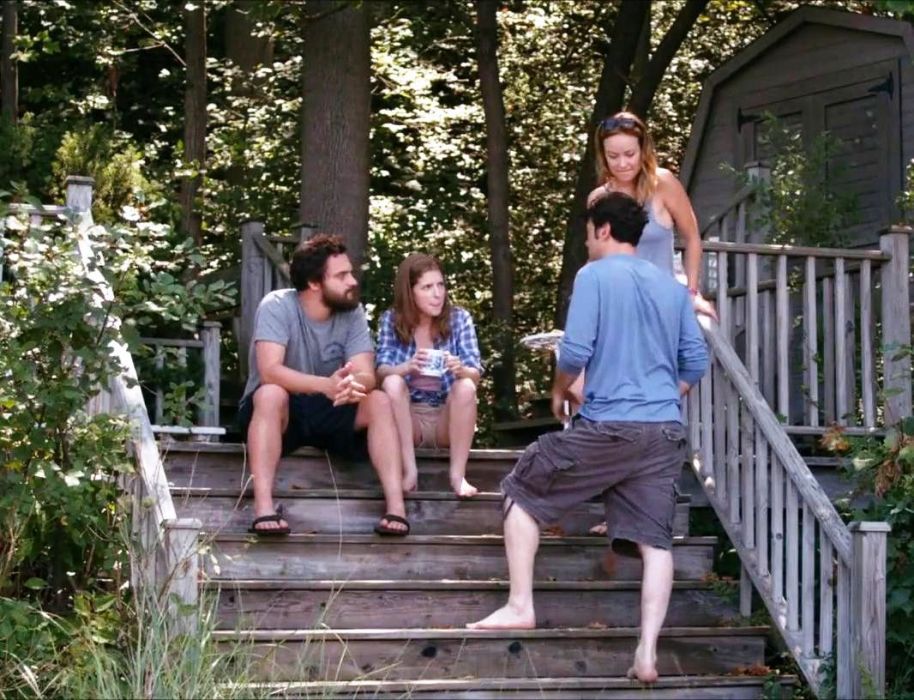If the stakes of most romantic comedies are preposterously overcomplicated – find a husband in 30 days, compete to seduce a member of the opposite sex for a magazine article, prove oneself to an authority figure to win the hand of his or her daughter – Drinking Buddies is delightfully simple.
The story of two coworkers and best friends who find their pal-hood tested as they explore relationships with other people, Joe Swanberg’s latest is a masterpiece of the understated, filled with honest, recognizable moments of human interaction that never depend on a case of mistaken identity, or even the tragic obstacle of a douchebag fiancée. Doing some of their best work to date, Olivia Wilde and Jake Johnson are perfectly suited for one another in a way that exudes will-they-or-won’t-they tension, while the rest of the film casually observes the authentic complexities of relationships as they’re tested, and eventually exposed, as obstacles – and sometimes, gateways – to true intimacy.
Wilde (TRON: Legacy) and Johnson (Safety Not Guaranteed) play Kate and Luke, longtime friends who work together at a Chicago microbrewery. Although their affinity for one another is palpable, the duo always remained platonic, instead finding love with others. But after Kate and Luke team up for a weekend in the country with their significant others, Chris (Ron Livingston of The Conjuring) and Jill (Anna Kendrick of Pitch Perfect), their attraction to one another begins to cause friction, even as the experience helps their partners understand what they want from a relationship. But after Kate and Chris break up, leaving her free to date whomever she pleases, Luke starts to question their potential as lovers, even as she tests the waters of singlehood with one of their other coworkers, Dave (Ti West of You’re Next).
It certainly helps that Wilde and Johnson are both effortlessly likeable performers, but Kate and Luke have precisely the right chemistry for a film to hinge upon whether they’ll go from friends to lovers. Smart, funny, laid-back and possessed of an equally high tolerance for alcohol, the two are, in a sense, exactly right for one another. But Swanberg slowly unveils each character’s underlying personality – the stuff that anchors a relationship, not just launches one – and highlights how potentially disastrous a coupling theirs might be. Despite her commitment to Chris, Kate won’t spend the night at her boyfriend’s house, and prefers facile physical and social connections to deeper emotional ones. Luke, meanwhile, already has a deep-rooted connection (even if he’s perhaps not quite aware of it) with Jill, and their differences complement one another rather than, say, pointing out why they’re incompatible.
But what’s more interesting is that the film avoids conventional conflict – most of their quasi-romantic entanglements are near-misses at best – and instead simply steps back to document that niggling jealousy that erupts when a friend of the opposite sex hooks up with someone you don’t approve of. Even if you’ve never been attracted to that person before, or have long-since known that a romance is out of the question, watching them with a person you don’t like becomes a form of torture, and eventually, self-torture. And Luke’s emerging envy of Dave forges a rift in their relationship that feels like a dramatic splinter, a small thing that wounds their friendship and forces them, if only in passing, to acknowledge those feelings that lurk beneath the calm surface of their platonic camaraderie.
As their significant others, meanwhile, there’s a rewarding lack of jealousy or suspicion on their part that also avoids creating cartoonish melodrama. Instead, their weekend in the country only galvanizes their attitudes about, well, not just the relationship they’re in, but relationships in general. Livingston, older than the rest of the cast by probably a decade, seems less to be trying to recapture old glories or to hang a trophy on his arm than to find the right girl for him during a time that’s already passed, and the actor gives that realization a poignancy that avoids branding him a douchebag or even bad guy to Luke’s good one. And Kendrick, easing into roles that don’t demand her to endlessly reprise type-A stuffiness, provides a sensible but entirely appealing companion who’s her own person, and whose intersection with Chris’ romantic identity crisis only solidifies her own wants and needs within her relationship with Luke.
Swanberg, whose pedigree makes him exceptionally well-suited to examine these sorts of pairings without elevating them to hysterical, Katherine Heigl levels of unbelievability, continues to evolve as a filmmaker, introducing plenty of dramatic foreshadowing – such as Chris’ choice of bourbon to drink, instead of beer – without overstating it. Moreover, he shows great refinement and maturity in the storytelling itself by setting up scenarios that seem like provocative new directions – such as when Luke alone volunteers to help Kate move – and then letting them unfold in ways that pay off in unconventional, albeit entirely realistic ways. Ultimately, Drinking Buddies is a remarkable alternative to the rest of the rom-com landscape, because it’s about people, not characters, and life, not drama. Of course, whether or not the two of them end up together is up to you to discover, but what’s most interesting is what they – and the audience -- learn in the process, which is a lot more rewarding, and honest, than the mystery that is resolved at its end.
Drinking Buddies is playing now in theaters.


